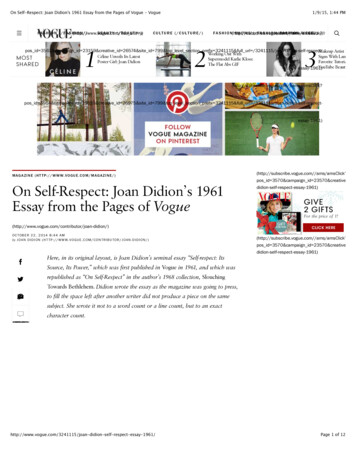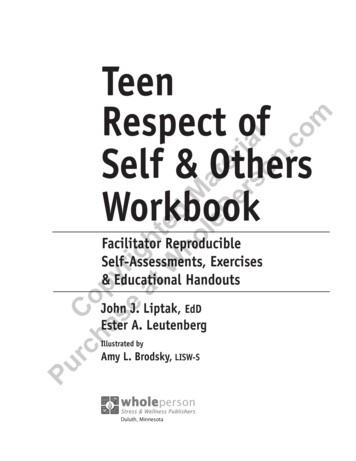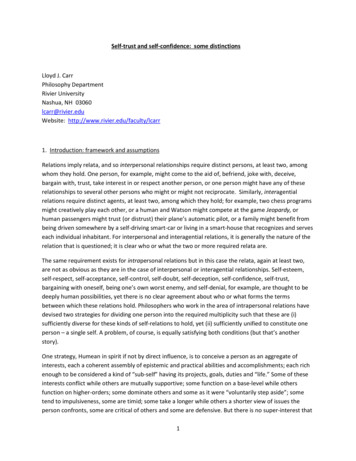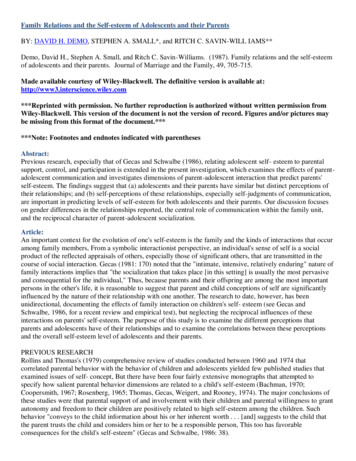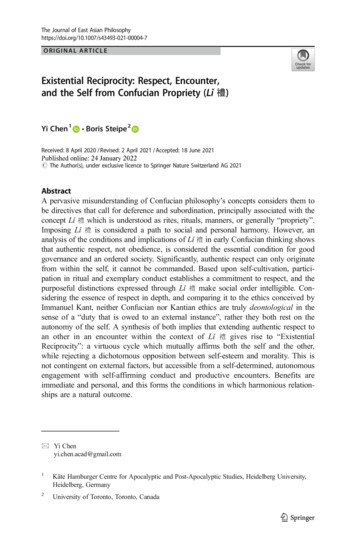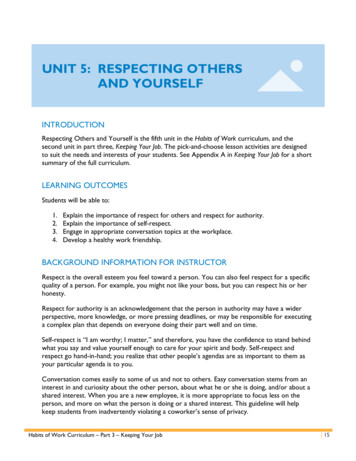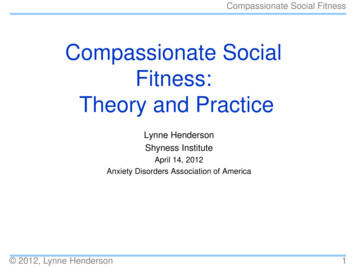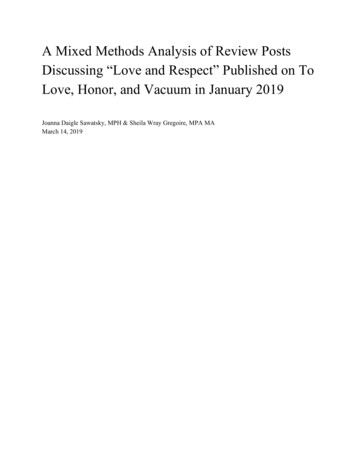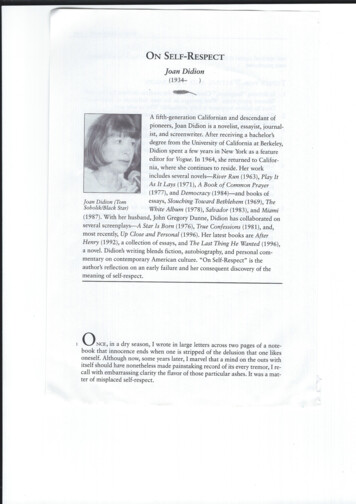
Transcription
ON SELF-RESPECTJoan Didion(1934-)A fifth-generation Californian and descendant ofpioneers, Joan Didion is a novelist, essayist, journalist, and screenwriter. After receiving a bachelor'sdegree from the University of California at Berkeley,Didion spent a few years in New York as a featureeditor for Vogue. In 1964, she returned to California, where she continues to reside. Her workincludes several novels-River Run (1963), Play ItAs It Lays (1971), A Book of Common Prayer(1977), and Democracy (1984)-and books ofessays,Slouching Toward Bethlehem (1969), TheJoan Didion (TomSobolik/Black Star)White Album (1978), Salvador (1983), and Miami(1987). With her husband, John Gregory Dunne, Didion has collaborated onseveral screenplays-A Star Is Born (1976), True Confessions (1981), and,most recently, Up Close and Personal (1996). Her latest books are AfterHenry (1992), a collection of essays, and The Last Thing He Wanted (1996),a novel. Didion's writing blends fiction, autobiography, and personal commentary on contemporary American culture. "On Self-Respect" is theauthor's reflection on an early failure and her consequent discovery of themeaning of self-respect.10NCE, in a dry season, I wrote in large letters across two pages of a notebook that innocence ends when one is stripped of the delusion that one likesoneself. Although now, some years later, I marvel that a mind on the outs withitself should have nonetheless made painstaking record of its every tremor, I recall with embarrassing clarity the flavor of those particular ashes. It was a matter of misplaced self-respect.
On Self-Respect24I 297I had not been elected to Phi Beta Kappa. This failure could scarcely havebeen more predictable or less ambiguous (I simply did not have the grades),but I was unnerved by it; I had somehow thought myself a kind of academicRaskolnikov, curiously exempt from the cause-effect relationships which hampered others. Although even the humorless nineteen-year-old that I was musthave recognized that the situation lacked real tragic stature, the day that I didnot make Phi Beta Kappa nonetheless marked the end of something, and innocence may well be the word for it. I lost the conviction that lights would alwaysturn green for me, the pleasant certainty that those rather passive virtueswhich had won me approval as a child automatically guaranteed me not onlyPhi Beta Kappa keys but happiness, honor, and the love of a good man; lost acertain touching faith in the totem power of good manners, clean hair, andproven competence on the Stanford-Binet scale. To such doubtful amulets hadmy self-respect been pinned, and I faced myself that day with the nonplusedapprehension of someone who has come across a vampire and has no crucifixat hand.Although to be driven back upon oneself is an uneasy affair at best, ratherlike trying to cross a border with borrowed credentials, it seems to me now theone condition necessary to the beginnings of real self-respect. Most of ourplatitudes notwithstanding, self-deception remains the most difficult deception. The tricks that work on others count for nothing in that very well-lit backalley where one keeps assignations with oneself; no winning smiles will dohere, no prettily drawn lists of good intentions. One shuffles flashily but invain through one's marked cards-the kindness done for the wrong reason, theapparent triumph which involved no real effort, the seemingly heroic act intowhich one had been shamed. The dismal fact is that self-respect has nothing todo with the approval of others-who are, after all, deceived easily enough; hasnothing to do with reputation, which, as Rhett Butler told Scarlett O'Hara, issomething people with courage can do without.To do without self-respect, on the other hand, is to be an unwilling audience of one to an interminable documentary that details one's failings,both real and imagined, with fresh footage spliced in for every screening.There's the glass you broke in anger, there's the hurt on X's face; watchnow, this next scene, the night Y came back from Houston, see how youmuff this one. To live without self-respect is to lie awake some night, beyondthe reach of warm milk, phenobarbital, and the sleeping hand on the coverlet, counting up the sins of commission and omission, the trusts betrayed,the promises subtly broken, the gifts irrevocably wasted through sloth orcowardice or carelessness. However long we postpone it, we eventually liedown alone in that notoriously uncomfortable bed, the one we make ourselves. Whether or not we sleep in it depends, of course, on whether or notwe respect ourselves.To protest that some fairly improbable people, some people who couldnot possibly respect themselves, seem to sleep easily enough is to miss thepoint entirely, as surely as those people miss it who think that self-respect has
2987ICHAPTER 6 Definitionnecessarily to do with not having safety pins in one's underwear. There is acommon superstition that "self-respect" is a kind of charm against snakes,something that keeps those who have it locked in some unblighted Eden, outof strange beds, ambivalent conversations, and trouble in general. It does notat all. It has nothing to do with the face of things, but concerns instead a separate peace, a private reconciliation. Although the careless, suicidal Julian English in Appointment in Samarra and the careless, incurably dishonest JordanBaker in The Great Gatsby seem equally improbable candidates for selfrespect, Jordan Baker had it, Julian English did not. With that genius for accommodation more often seen in women than in men, Jordan took her ownmeasure, made her own peace, avoided threats to that peace: "I hate carelesspeople," she told Nick Carraway. "It takes two to make an accident."Like Jordan Baker, people with self-respect have the courage of their mistakes. They know the price of things. If they choose to commit adultery, theydo not then go running, in an access of bad conscience, to receive absolutionfrom the wronged parties; nor do they complain unduly of the unfairness, theundeserved embarrassment, of being named corespondent. In brief, peoplewith self-respect exhibit a certain toughness, a kind of moral nerve; they display what was once called character, a quality which, although approved in theabstract, sometimes loses ground to other, more instantly negotiable virtues.The measure of its slipping prestige is that one tends to think of it only in connection with homely children and United States senators who have been defeated, preferably in the primary, for reelection. Nonetheless, character-thewillingness to accept responsibility for one's own life-is the source fromwhich self-respect springs.Self-respect is something that our grandparents, whether or not they hadit, knew all about. They had instilled in them, young, a certain discipline, thesense that one lives by doing things one does not particularly want to do, byputting fears and doubts to one side, by weighing immediate comforts againstthe possibility of larger, even intangible, comforts. It seemed to the nineteenthcentury admirable, but not remarkable, that Chinese Gordon put on a cleanwhite suit and held Khartoum against the Mahdi; it did not seem unjust thatthe way to free land in California involved death and difficulty and dirt. In adiary kept during the winter of 1846, an emigrating twelve-year-old namedNarcissa Cornwall noted coolly: "Father was busy reading and did not noticethat the house was being filled with strange Indians until Mother spoke aboutit." Even lacking any clue as to what Mother said, one can scarcely fail to beimpressed by the entire incident: the father reading, the Indians filing in, themother choosing the words that would not alarm, the child duly recording theevent and noting further that those particular Indians were not, "fortunatelyfor us," hostile. Indians were simply part of the donnee.In one guise or another, Indians always are. Again, it is a question of recognizing that anything worth having has its price. People who respect themselves are willing to accept the risk that the Indians will be hostile, that theventure will go bankrupt, that the liaison may not turn out to be one in which
On Self-Respect9101112I 299every day is a holiday because you're married to me. They are willing to investsomething of themselves; they may not play at all, but when they do play, theyknow the odds.That kind of self-respect is a discipline, a habit of mind that can never befaked but can be developed, trained, coaxed forth. It was once suggested to methat, as an antidote to crying, I put my head in a paper bag. As it happens,there is a sound physiological reason, something to do with oxygen, for doingexactly that, but the psychological effect alone is incalculable: it is difficult inthe extreme to continue fancying oneself Cathy in Wuthering Heights withone's head in a Food Fair bag. There is a similar case for all the small disciplines, unimportant in themselves; imagine maintaining any kind of swoon,commiserative or carnal, in a cold shower.But those small disciplines are available only insofar as they representlarger ones. To say that Waterloo was won on the playing fields of Eton is notto say that Napoleon might have been saved by a crash program in cricket; togive formal dinners in the rain forest would be pointless did not the candlelightflickering on the liana call forth deeper, stronger disciplines, values instilledlong before. It is a kind of ritual, helping us to remember who and what weare. In order to remember it, one must have known it.To have that sense of one's intrinsic worth which constitutes self-respect ispotentially to have everything: the ability to discriminate, to love and to remainindifferent. To lack it is to be locked within oneself, paradoxically incapable ofeither love or indifference. If we do not respect ourselves, we are on the onehand forced to despise those who have so few resources as to consort with us,so little perception as to remain blind to our fatal weaknesses. On the other,we are peculiarly in thrall to everyone we see, curiously determined to liveout-since our self-image is untenable-their false notions of us. We flatterourselves by thinking this compulsion to please others an attractive trait: a gistfor imaginative empathy, evidence of our willingness to give. Of course I willplay Francesca to your Paolo, Helen Keller to anyone's Annie Sullivan: no expectation is too misplaced, no role too ludicrous. At the mercy of those wecannot but hold in contempt, we play roles doomed to failure before they arebegun, each defeat generating fresh despair at the urgency of divining andmeeting the next demand made upon us.It is the phenomenon sometimes called "alienation from self." In its advanced stages, we no longer answer the telephone, because someone mightwant something; that we could say no without drowning in self-reproach isan idea alien to this game, Every encounter demands too much, tears thenerves, drains the will, and the specter of something as small as an unanswered letter arouses such disproportionate guilt that answering it becomesout of the question. To assign unanswered letters their proper weight, to freeus from the expectations of others, to give us back to ourselves-there liesthe great, the singular power of self-respect. Without it, one eventually discovers the final turn of the screw: one runs away to find oneself; and finds noone at home.
300I CHAPTER 6 DefinitionTOPICS1.FOR WRITINGANDDISCUSSIONWhy was Didion upset that she was not elected to Phi Beta Kappa? Howdid this failure initially change the way she looked at herself? What examples does she provide in paragraph 2 to explain her altered view of herselfand her future?2. At the beginning of paragraph 5, Didion anticipates an objection somereaders might make to her comments on self-respect. Explain the protestDidion expects and her response to that protest. Do you find her ideasconvincing? Why or why not?3. Didion uses several different methods as she develops her definition. Oneparticularly effective method is the use of examples. Beginning with paragraph 2, notice the pattern she follows for presenting examples. Do youfind this pattern effective? Why?4. Didion cites many authorities and makes many literary and historical allusions. What do these citations and allusions suggest about Didion's view ofher audience? Would the essay be difficult to understand for the readerwho did not recognize the sources or the meaning of the allusions?5. Choose a concept such as honesty, loyalty, pride, bravery, or self-doubt,and write an essay that builds a definition of the concept through the useof anecdotes, examples, allusions, and references to authorities.
Her latest books are After Henry (1992), a collection of essays, and The Last Thing He Wanted (1996), a novel. Didion's writing blends fiction, autobiography, and personal com mentary on contemporary American culture. "On Self-Respect" is the author's reflection on an early failure and her consequent discovery of the meaning of self-respect. 1 0
